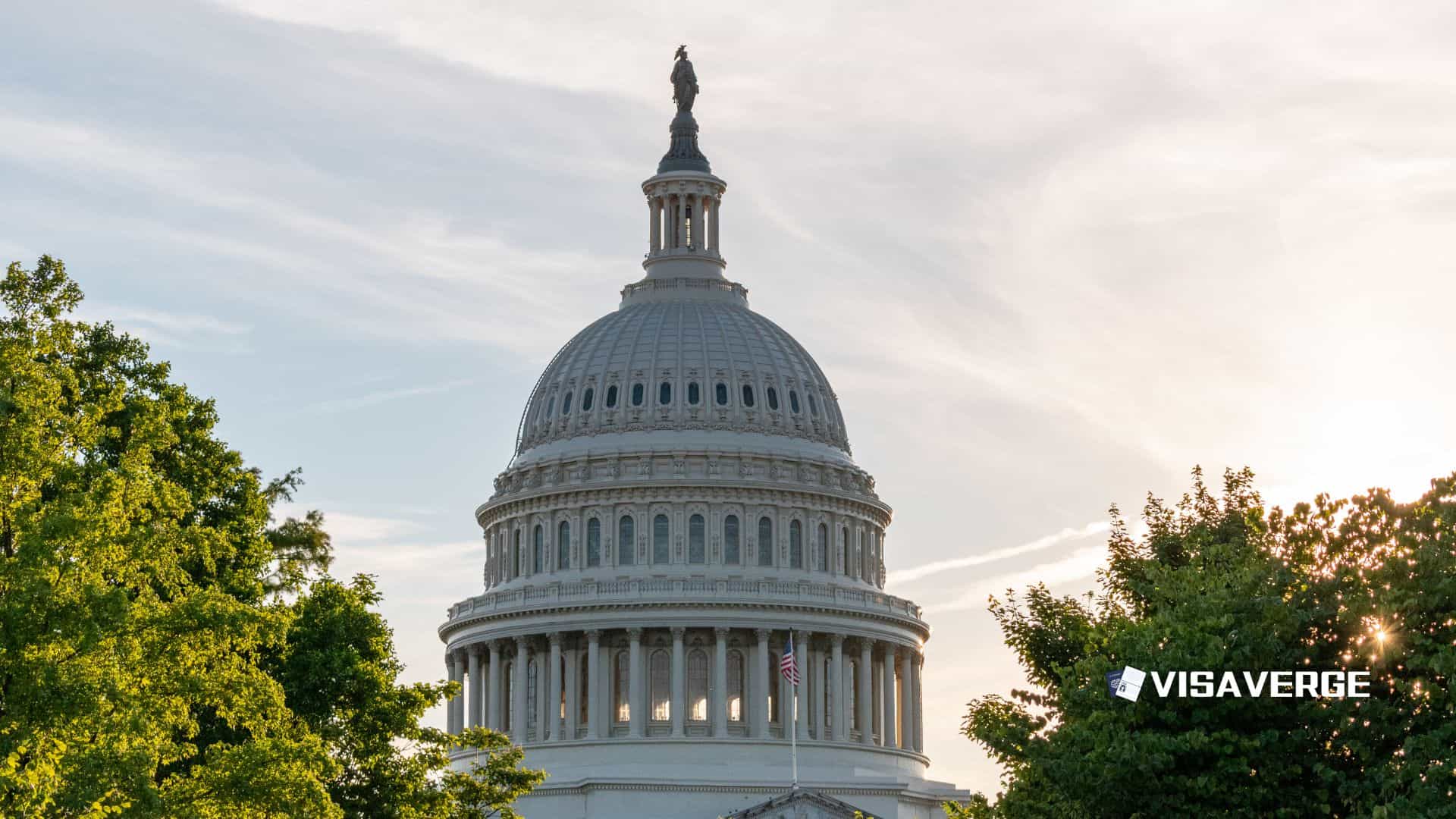Key Takeaways
• Stephen Miller claims the INA blocks federal court review of presidential immigration actions, but experts widely disagree.
• Federal courts have repeatedly ruled they retain oversight, especially where constitutional rights or due process are at stake.
• The INA limits some court reviews but cannot override the Constitution’s protection of judicial review for immigration cases.
Stephen Miller, who served as a close adviser on immigration matters to President Trump, recently stated that federal courts cannot rule on immigration actions taken by the executive branch. He says that the Immigration and Nationality Act (INA) removes the power of Article III courts, which are federal courts, to make rulings on these actions. According to Miller, many recent examples where courts have stopped or questioned the Trump administration’s immigration policies violated what Congress had directly decided in law.
However, many experts do not agree with Stephen Miller. They point out that what he says does not fit with what the law actually says, or how the Constitution works. This dispute has sparked a wide discussion about presidential power, the rights of immigrants, and the important checks federal courts provide over immigration policy.

To better understand this debate, it is important to first look at what the Immigration and Nationality Act actually says, how federal courts are involved, and what the U.S. Constitution requires.
What the Immigration and Nationality Act (INA) Does
The Immigration and Nationality Act is the main federal law covering how people can enter, stay in, and be removed from the United States 🇺🇸. It sets out many rules and procedures government officials must follow in immigration matters. It also gives some limits on when and how federal courts can review decisions made by immigration officials. For example, the INA says that federal courts usually cannot review certain fast-track deportation orders (called “expedited removal”), and that appeals in immigration cases must be filed in set time limits.
But, the law does not mean federal courts have no power at all when it comes to immigration. In fact, the INA is written so that even as it limits some reviews, it still allows courts to decide on important cases, especially those involving constitutional rights. As explained by legal expert Hiroshi Motomura, “Congress did not — and could not, due to provisions of the US Constitution — end all court jurisdiction to hear immigration cases.” In other words, the Constitution creates some limits on how much Congress can take away the courts’ ability to review immigration matters.
Federal courts, which include district courts and the Supreme Court, still play an important part in making sure government actions follow the law and the Constitution. They often rule on important questions—such as whether a government policy is fair, whether due process was given to someone facing deportation, and whether agencies followed proper procedures. In practice, courts have struck down or changed government immigration actions many times, especially when those actions violated legal rules or people’s rights.
Constitutional Protections and Due Process
A central part of this dispute is what the Constitution says about the rights of immigrants. The Fifth Amendment of the U.S. Constitution protects everyone in the United States, not just U.S. citizens. It says that no one can be deprived “of life, liberty, or property, without due process of law.” “Due process” means that before the government can lock someone up, deport them, or take away important rights, they must follow fair steps—like giving a person a chance to see the evidence against them or to argue their side.
Legal scholars stress that these protections apply broadly, even to people who are not U.S. citizens but are present in the United States. This principle is widely accepted in court cases and by legal experts, no matter what the current president’s policies may be. While the INA allows faster deportations in limited cases, it does not completely erase the court’s power to step in if someone’s constitutional rights are violated.
Some advisers to Trump, like Stephen Miller and Vice President JD Vance, have argued that court review in these cases is not needed or is somehow “wrong.” But most legal scholars strongly disagree. They warn that making immigration enforcement free from court oversight is a “slippery slope” that would weaken the constitutional system of checks and balances. As reported by VisaVerge.com, courts are seen as the “last line of defense” in making sure that the government cannot remove people or change their lives in drastic ways without following the law.
Recent Court Rulings on Immigration
Recent actions by the Supreme Court and lower federal courts show how much ongoing involvement judges have in this area. For example, courts have stopped some deportations from taking place while legal questions are decided. In other cases, courts have required the government to go back and give people fair hearings or consider new evidence.
One leading example is the case of Kilmar Armando Abrego Garcia, a Salvadoran national who was deported under the Trump administration. The Supreme Court later ruled that the administration should “facilitate” his return to the United States 🇺🇸 after finding that the deportation was done by mistake. Miller argued that this was actually a win for narrow executive power, but fact-checks noted that the ruling still forced the government to actively help Garcia return, not just leave the mistake uncorrected.
These cases show that federal courts still do have the power to order the executive branch to follow court decisions in immigration cases. They also demonstrate that while the president may have broad power over immigration under the INA, this power is not without limits. When constitutional rights are threatened, federal judges do have the authority to step in, as they have done many times in recent history.
Legal Authority Over Immigration: What Experts Say
To help make the issues clearer, this table compares what Stephen Miller claimed to what legal experts and court rulings show to be true:
| Claim by Stephen Miller | What the Law and Experts Say |
|---|---|
| Courts can’t rule on Trump’s immigration actions | False. Federal courts still have the power to review presidential actions, especially when constitutional rights are at stake. The INA puts some limits, but does not remove all court authority. |
| INA strips all court authority | Misleading. While the INA sets some limits, courts keep core review powers—especially for “big” questions like constitutional and process issues. |
| Only American citizens get court protections | Not true. The Constitution’s protection of due process applies to non-citizens in the United States as well. |
This comparison highlights how the federal court system acts as a check on executive power, and how the INA is just one part of a much larger legal puzzle that includes the Constitution and Supreme Court precedent.
Legislative and Legal Timeline
The Immigration and Nationality Act has been amended many times since it was first passed in 1952. Over the decades, Congress and various presidents have changed and expanded its rules, including in response to court decisions. However, the Supreme Court and other federal courts have repeatedly held that, no matter what changes Congress makes, they cannot take away the Constitution’s protection of due process and the basic power of courts to decide legal questions.
From the time of the act’s original wording to present-day administrations, courts and Congress have often disagreed on how much power the president should have, with courts stepping in when rights are at risk. Some restrictions on court review have been added, such as in fast-track removal cases, but even then exceptions exist for serious constitutional issues. This long-standing balance remains at the heart of America’s legal approach to immigration.
Why This Debate Matters to Immigrants and the Public
These debates about court power and presidential actions are not just abstract legal arguments; they have real effects on people’s lives. Many immigrants depend on court review to get fair hearings and sometimes to avoid wrongful deportation. For families, employers, and communities, clear and fair rules are important to avoid errors, ensure people are not separated unfairly, and maintain trust in the legal system.
When powerful officials claim that courts cannot intervene in immigration matters, it creates concern that mistakes might be left uncorrected and that individual rights could be ignored. That’s why both courts and most legal scholars push back so strongly against ideas that would remove all judicial oversight.
The Real Limits of Court Jurisdiction under the INA
It is true that Congress can set up some limits on which immigration decisions are open to court review. For example, there are rules about when a person can appeal a deportation order or challenge a visa denial. There are also some very narrow circumstances where Congress has said courts cannot review a decision at all, such as in matters of national security.
However, American courts keep a key role—especially when constitutional rights are likely to be violated or where agencies break their own rules. Over the years, courts have reviewed everything from how evidence is used against immigrants to whether government policy was applied fairly.
As one Supreme Court case explained, even when a law says “no court may review,” that does not block courts from weighing in if the case raises big constitutional concerns. The federal courts are called the “guardians” of the Constitution for this reason.
Common Questions about Courts and Immigration Law
People often ask several questions about this topic, such as:
- Can Congress really block all lawsuits over immigration rules? No. The Constitution makes sure that courts can hear constitutional questions, even if Congress puts up limits on other types of cases.
-
If someone is being deported on a fast-track basis, do they get any court review? Sometimes the INA says there’s almost no review, but if there is a problem related to constitutional rights—like being punished without any hearing—courts can still step in.
-
Do only American citizens get due process protections in immigration? No. Court decisions say that anyone physically present in the United States has the right to fair legal procedures before being sent out of the country.
Implementation and Compliance for Immigrants, Applicants, and Employers
For people applying for visas, living in the United States, or employing immigrant workers, knowing that courts play this role is important. It gives some protection that agencies must follow the rules and cannot take away rights without giving people a fair chance to argue their case.
If new laws, rules, or presidential executive orders change immigration policy, affected people may still have the ability to challenge the actions if basic rights are not respected. As the debate continues, it is essential for anyone facing immigration processes to speak with a lawyer who understands the Immigration and Nationality Act and the power of federal courts.
Conclusion and Recommendations
The main point is clear: Stephen Miller’s claim that courts cannot review or rule on presidential immigration actions does not fit the Constitution and long-standing practice. The Immigration and Nationality Act has some rules that narrow court review, but those rules do not close the courts’ doors altogether—especially when constitutional rights are at stake. Federal courts serve as a key “backstop” to preserve fair treatment for everyone inside the United States.
For individuals and families inside the United States whose immigration status is in question, for employers who hire foreign workers, and for the lawyers who guide them, knowing that judicial review remains available is central to defending rights and getting a fair result.
Readers are encouraged to review the official INA text for detailed information, and always consult a trained and experienced immigration lawyer for advice on their specific situations.
This article summarizes the law and expert opinion as of the current date and is meant for general education only. For legal problems or personal situations, seek help from a licensed legal professional.
Learn Today
Immigration and Nationality Act (INA) → The primary federal law that governs U.S. immigration policy, including rules for entry, deportation, and court review.
Article III courts → Federal courts established under Article III of the U.S. Constitution, including district courts and the Supreme Court.
Expedited removal → A fast-track deportation process that limits court review except in cases raising constitutional concerns.
Due Process → The constitutional guarantee that government must follow fair procedures before depriving anyone of life, liberty, or property.
Judicial Review → The authority of courts to examine the legality and constitutionality of actions by government agencies or officials.
This Article in a Nutshell
Stephen Miller’s assertion that federal courts cannot review presidential immigration actions under the INA is disputed by most legal experts. Courts continue to uphold oversight, especially when constitutional rights are involved. The INA imposes some restrictions, but constitutional safeguards ensure judicial review remains crucial in immigration matters for non-citizens as well.
— By VisaVerge.com
Read more:
• Illinois challenges new federal immigration enforcement funding rules
• Gentner Drummond urges Kevin Stitt to deploy National Guard for immigration
• Trump Immigration Crackdown Sparks Fear in Sonoma County
• Waltham residents protest immigration raids after surge in ICE actions
• UK immigration system set for major changes to Skilled Worker Visa rules













